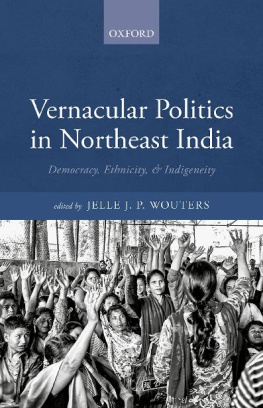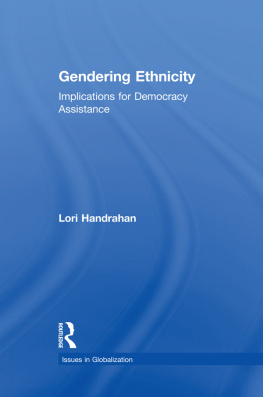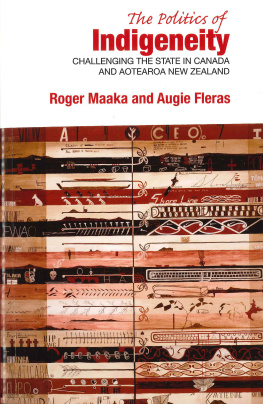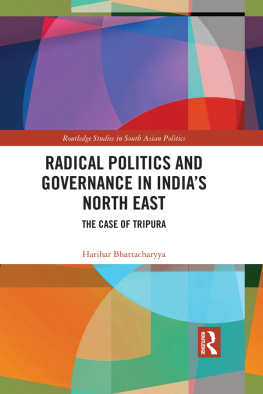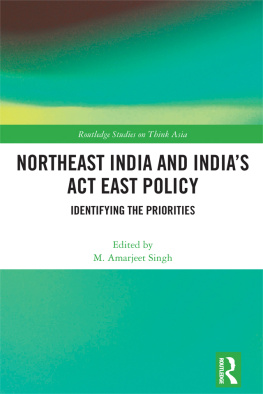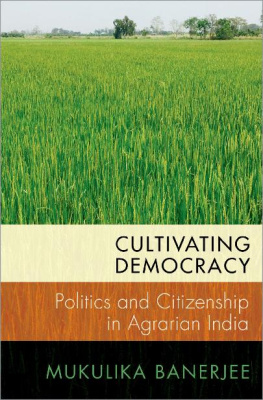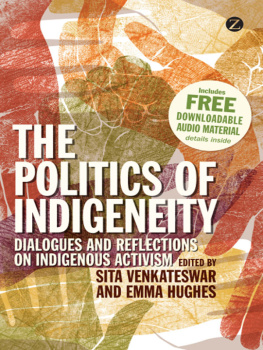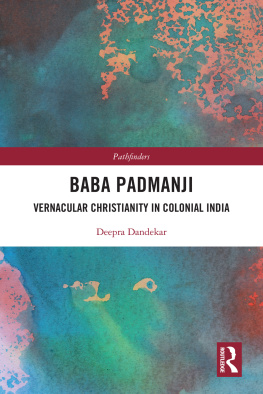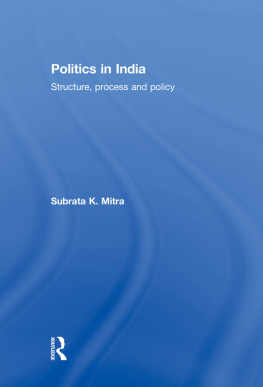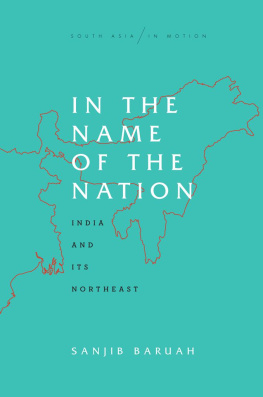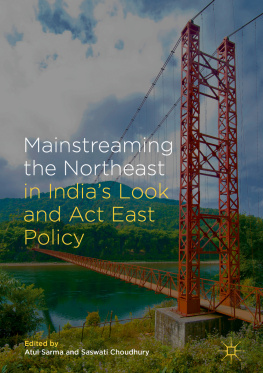This is a breakthrough collection: a new generation of scholars launching a new generation of scholarship on Indian politics. Free of post-colonial pieties and sanctimonious calls for decolonization, this volume takes you deep inside the thought worlds of Northeastern politics, carefully tracking ways in which political actors themselves judge, decide, and act. You will learn not only about Northeastern India but also about how to go about comprehending other peoples politics, in India or anywhere else. Read this book.
Anastasia Piliavsky, Kings College, London
Jelle J.P. Wouters has come of age, both in terms of theoretical insights and writing skills, and with Vernacular Politics in Northeast India , he seems fully poised to dominate the scene. This book not only brings together some of the theoretically most topical, portent, and inebriating concepts like counter-sovereignties, ethno-politics, biomoral politics, prophecy as politics, cosmo-politics, alter-politics, and compressed modernity, but also some of the most promising young and a few but highly accomplished senior scholars.
Tanka B. Subba, North-Eastern Hill University, Shillong
The book is a refreshing engagement with what acts as the soul of the political in Northeast India. Crafted on rich ethnographic, historical, and empirical data, combined with analysis and theorization, the collection of chapters makes an indelible mark and takes the study of the region to a new height.
Virginius Xaxa, Institute for Human Development, New Delhi
Vernacular Politics in Northeast India
Democracy, Ethnicity, and Indigeneity
Edited by
JELLE J.P. WOUTERS
Associate Professor, Department of Social Sciences,
Royal Thimphu College, Bhutan
Great Clarendon Street, Oxford, ox2 6dp,
United Kingdom
Oxford University Press is a department of the University of Oxford.
It furthers the Universitys objective of excellence in research, scholarship, and education by publishing worldwide. Oxford is a registered trade mark of Oxford University Press in the UK and in certain other countries
Oxford University Press 2022
The moral rights of the author have been asserted
First Edition published in 2022
Impression: 1
All rights reserved. No part of this publication may be reproduced, stored in a retrieval system, or transmitted, in any form or by any means, without the prior permission in writing of Oxford University Press, or as expressly permitted by law, by licence or under terms agreed with the appropriate reprographics rights organization. Enquiries concerning reproduction outside the scope of the above should be sent to the Rights Department, Oxford University Press, at the address above
You must not circulate this work in any other form and you must impose this same condition on any acquirer
Published in the United States of America by Oxford University Press
198 Madison Avenue, New York, NY 10016, United States of America
British Library Cataloguing in Publication Data
Data available
Library of Congress Control Number: 2022931395
ISBN 9780192863461
eISBN 9780192678263
DOI: 10.1093/oso/9780192863461.001.0001
Links to third party websites are provided by Oxford in good faith and for information only. Oxford disclaims any responsibility for the materials contained in any third party website referenced in this work.
Contents
Jelle J.P. Wouters
Sean M. Dowdy
Milinda Banerjee
Saba Sharma
Swargajyoti Gohain
Joy L.K. Pachuau
Thongkholal Haokip
Edward Moon-Little
Leishipem Khamrang and Jelle J.P. Wouters
Michael T. Heneise
Kaustubh Deka
Maranatha G.T. Wahlang and Bengt G. Karlsson
Sajal Nag
Mabel Gergan
David N. Gellner
Perhaps nowhere in India is contemporary politics and visions of the political as diverse, animated, uncontainable, and poorly understood as in Northeast India. All across this region, and involving its 200-odd communities, the political is a dominating feature of the social landscape. It locally unfolds as a complex, often volatile field of material desires, existential anxieties, social practices, moral evaluations, ontological clashes, and imaginative future visions that everywhere overflow the shores of a politics defined in a narrow, institutional sense. This is the first contention of this bookthe impossibility, that is, of locating and identifying the political in any definite place and sense. From this, it follows that to grasp the scale and substance of politics and the political requires a flexible, transdisciplinary, empirically open, and all-encompassing approach.
By approaching politics in the vernacular, this book takes as its base the entangled political practices and principles, ontologies and cosmologies, structures, sentiments and subjectivities, and registers and rhetoric that stem from local realities that are mediated by enduring cultural imprints and sentience. These realities encompass both subaltern and elite strata of tribal, ethnic, and indigenous polities, and in the contemporary historical moment unfold in dialectical tension and synthesis with the Indian state, the democratic process, and globalist discourses of indigeneity. This proposed forefronting of the vernacular form and substance of the political, of actually existing politics, and of the contentiously unfolding history of the political present impels urgency. This is because what guides and animates Northeast Indias spirited political sphere, and the categories and values through which its peoples conceive of their political lives, are often misread and remain vastly under-studied and under-theorized.
Even a cursory look at Indian round-the-clock news channels, or a glance at national newspapers, reveals that the ways Northeasterners go about their political lives befuddle even the most astute mainland political pundits and theorists. They readily declare the Northeast as different and other-than-Indian as they struggle to make sense of seemingly sudden ethnic flares and decades-old political conflicts that refuse to die out, the proliferation of ethno-nationalist projects every other hill and valley, and claims and contests over indigenous recognition and rights. What confuses many of them further is the distinct ethnicization of local identities, the fetishization of putatively ancient customary laws, the political potency of millenarian prophecies of various kinds, a public sphere suffused with tribal bodies, and the occasional burst of gruesome ethnic violence and uncontrollable tribalism. To them, as with many scholars of South Asia, Northeast Indian politics, so to speak, often stays an enigmaa puzzle seemingly impossible to solve.
This collection of chapters cannot reasonably purport to solve this puzzle once and for all. Even as it is possible to tease out and theoretically engage certain more general problems, predicaments, and provocations, as is attempted in the introduction that follows, no orchestrated effort is made to draw the diversity of the various chapters into what might pretend to be a unified approach, narrative or theory of Northeast Indian politics. Per contra, an important part of this exercise is precisely to illuminate quite how diverse the political complexities, interplays, and entanglements are across the region. Collectively, though, its contributors try to think their way afresh into the regions political life and sense.



